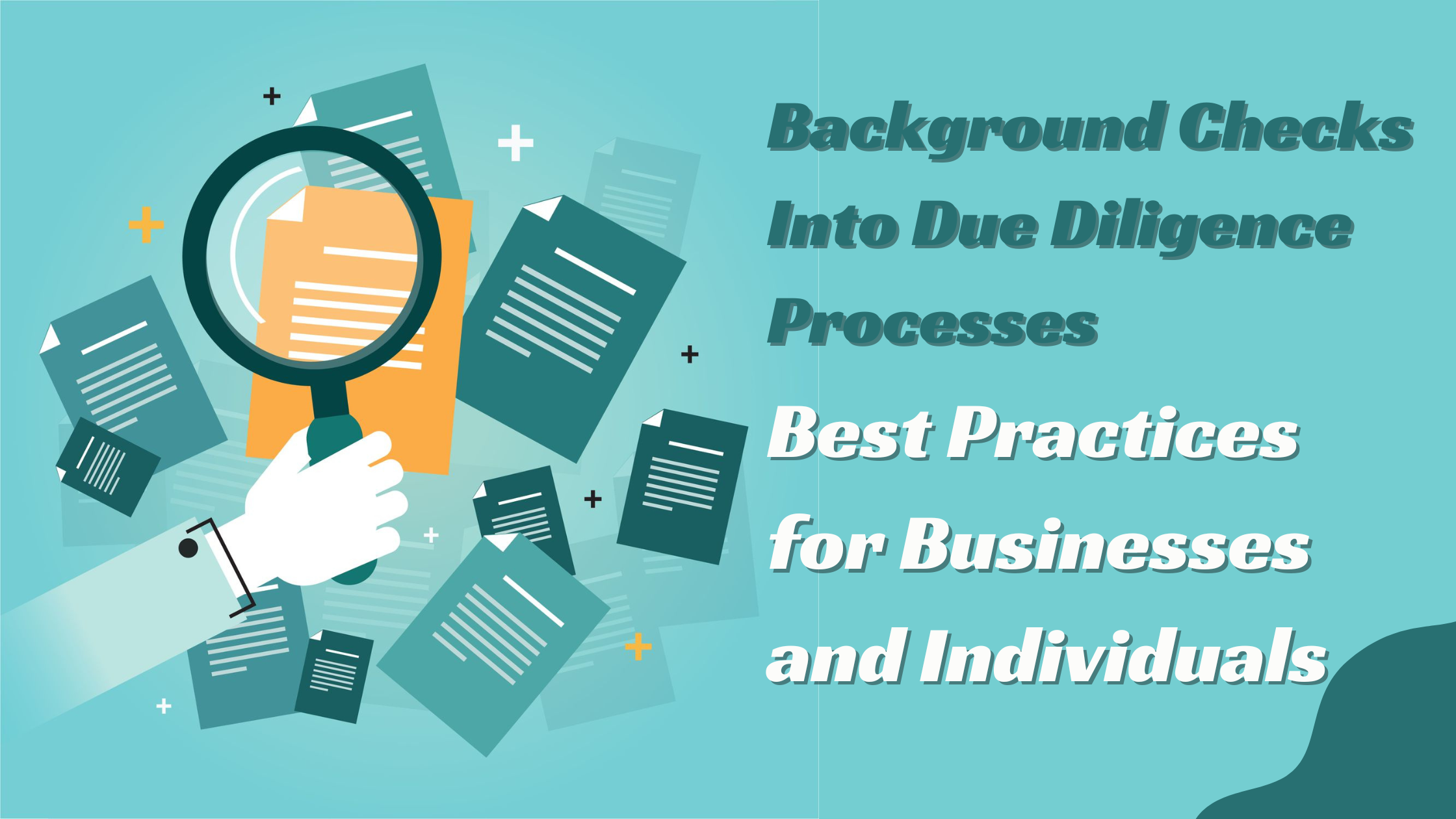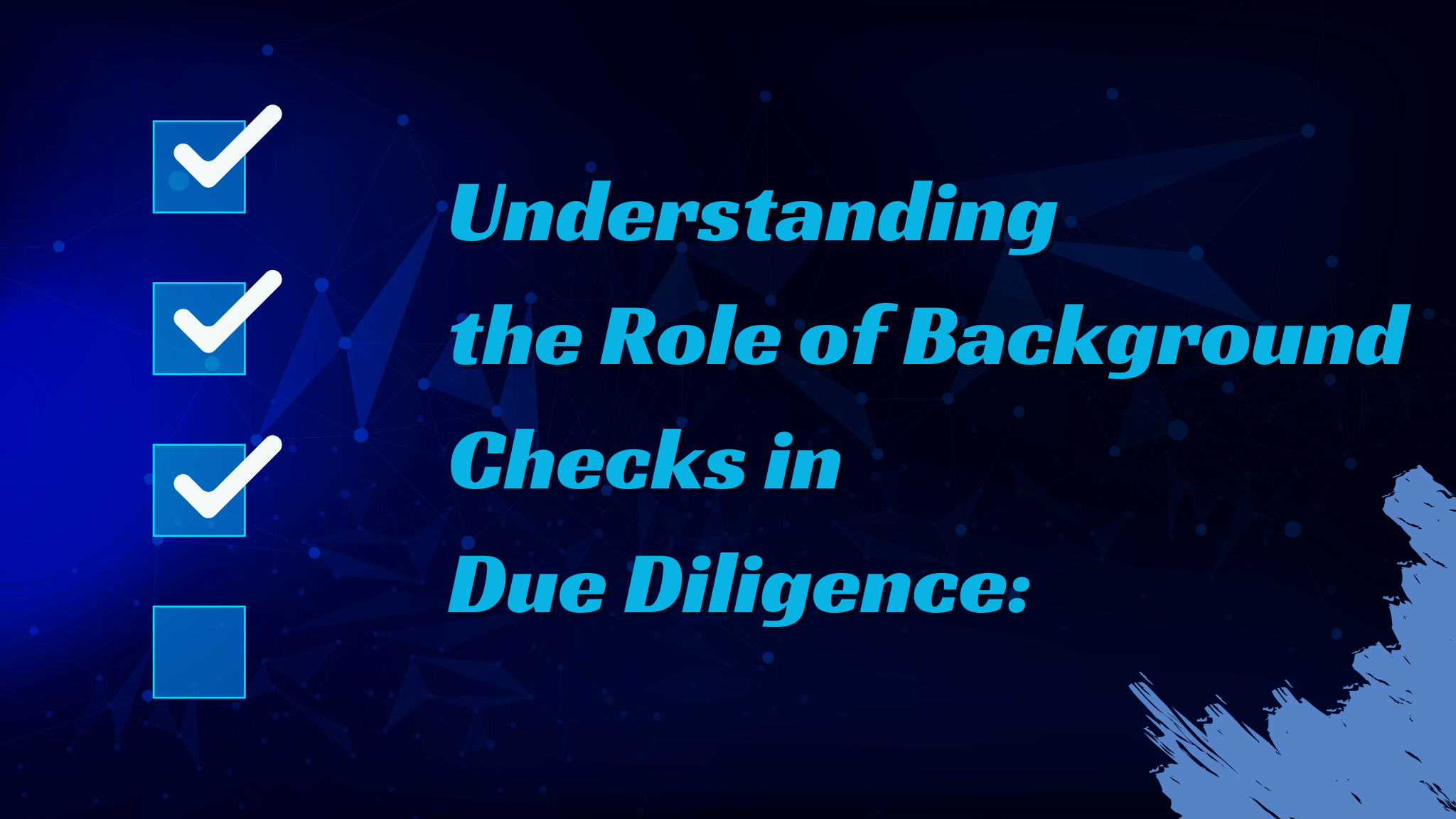Incorporating Background Checks Into Due Diligence Processes: Best Practices for Businesses and Individuals
- 1 Understanding the Role of Background Checks in Due Diligence:
- 2 Best Practices for Businesses:
- 2.1 Define Clear Criteria:
- 2.2 Use Reliable Sources:
- 2.3 Obtain Consent:
- 2.4 Conduct Thorough Checks:
- 2.5 Maintain Confidentiality:
- 2.6 Stay Updated:
- 3 Best Practices for Individuals:
- 3.1 Self-Awareness:
- 3.2 Verify Information:
- 3.3 Maintain Transparency:
- 3.4 Understand Rights:
- 3.5 Seek Guidance:
- 4 Conclusion:
Due diligence has become essential for businesses and individuals in today’s dynamic and interconnected world. Conducting thorough background checks is a critical component of due diligence processes, whether hiring new employees, entering into business partnerships, or engaging in personal relationships.
Background checks provide valuable insights into individuals’ backgrounds, helping mitigate risks, ensure compliance, and make informed decisions. This blog will explore the importance of incorporating background checks into due diligence processes and outline best practices for businesses and individuals.
Understanding the Role of Background Checks in Due Diligence:
Risk Mitigation:
Background checks help identify potential risks associated with individuals, such as criminal history, financial instability, or past misconduct. By uncovering relevant information, businesses and individuals can assess the level of risk and take appropriate measures to mitigate it.
Compliance:
In many industries, regulatory requirements mandate background checks as part of due diligence processes to ensure compliance with legal and industry standards. Businesses must adhere to regulations governing employment screening, tenant verification, financial transactions, and other areas where background checks are relevant.
Informed Decision-Making:
Background checks provide critical information that enables businesses and individuals to make informed decisions. Whether evaluating job candidates, assessing business partners, or vetting tenants, background checks help identify red flags, validate credentials, and verify claims, reducing the likelihood of making costly mistakes.
Reputation Protection:
Incorporating background checks into due diligence processes helps protect businesses’ and individuals’ reputations and integrity. By screening individuals thoroughly, organizations can avoid associating with individuals with questionable backgrounds or unethical behavior, safeguarding their brand image and credibility.
Best Practices for Businesses:
Define Clear Criteria:
Before conducting background checks, businesses should define clear criteria for the information they seek to uncover. Whether screening employees, vendors, or business partners, establish specific requirements based on job roles, industry standards, and regulatory obligations.
Use Reliable Sources:
Choose reputable background check services or sources of information to ensure the accuracy and reliability of the data obtained. Consider using multiple sources and cross-referencing information to verify its validity and minimize the risk of errors or discrepancies.
Obtain Consent:
Obtain consent from individuals before conducting background checks and inform them of the purpose, scope, and use of the information obtained. Compliance with data protection laws and regulations, such as the Fair Credit Reporting Act (FCRA), is essential to protect individuals’ privacy rights.
Conduct Thorough Checks:
Conduct comprehensive background checks tailored to each situation’s specific needs and requirements. Depending on the context, this may include criminal history checks, employment verification, education verification, credit checks, and reference checks.
Maintain Confidentiality:
Handle background check information with the utmost confidentiality and discretion, ensuring that sensitive data is protected from unauthorized access or disclosure. Implement appropriate security measures to safeguard personal and sensitive information throughout the screening process.
Stay Updated:
Regularly review and update background check policies and procedures to stay abreast of changes in regulations, industry standards, and best practices. Periodically reassess the effectiveness of background screening protocols and make adjustments as needed to enhance efficiency and compliance.
Best Practices for Individuals:
Self-Awareness:
Individuals should proactively understand their background and address any potential red flags or areas of concern. They should also be prepared to provide accurate and honest information when undergoing background checks for employment, housing, or other purposes.
Verify Information:
Verify the accuracy and completeness of personal information provided to employers, landlords, or other parties conducting background checks. Ensure that resumes, applications, and other documents accurately reflect qualifications, credentials, and employment history.
Maintain Transparency:
When undergoing background checks, be transparent and forthcoming about past experiences, including any criminal history or legal issues. Honesty and integrity are essential in building trust and credibility with potential employers, landlords, or business partners.
Understand Rights:
Familiarize yourself with your rights regarding background checks, including the right to consent to screening, review and dispute information, and privacy under applicable laws and regulations.
Seek Guidance:
Seek guidance from legal professionals or advisors if you have questions or concerns about background checks or their implications for your personal or professional life. Understanding your rights and responsibilities can help you navigate the background check process confidently and safely.
Conclusion:
Incorporating background checks into due diligence processes is essential for businesses and individuals seeking to mitigate risks, ensure compliance, and make informed decisions. By understanding the role of background checks, defining clear criteria, using reliable sources, obtaining consent, conducting thorough checks, maintaining confidentiality, staying updated on regulations, and following best practices, businesses can protect their interests and reputations.
Similarly, individuals can enhance their credibility, transparency, and trustworthiness by being self-aware, verifying information, maintaining transparency, understanding their rights, and seeking guidance when needed. Ultimately, incorporating background checks into due diligence processes contributes to safer, more compliant, and more trustworthy interactions in both personal and professional contexts.


















